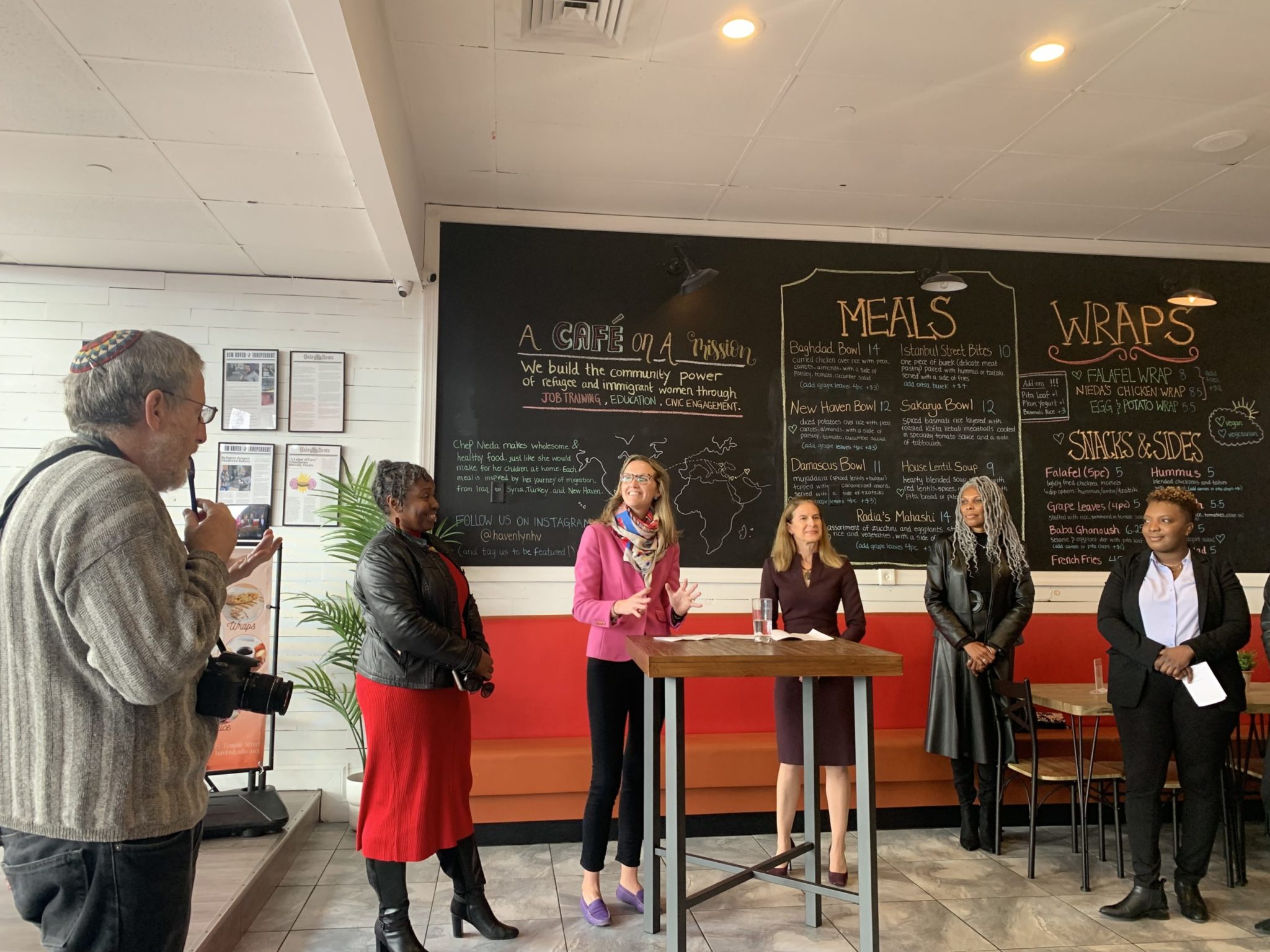Community Foundation for Greater New Haven awarded $7.2 million from state to uplift small businesses
With the state funding and an additional $1.5 million from the city, the Community Foundation for Greater New Haven hopes to award grants and provide consulting and technical services to small businesses, particularly BIPOC and women-owned businesses.

Laura Ospina, Contributing Photographer
The Community Foundation for Greater New Haven will pour almost $9 million into creating a more equitable small business community in the greater New Haven area.
One of the 10 nonprofit economic development organizations to receive funding, the foundation plans to use its grant to create the New Haven Equitable Entrepreneurial Ecosystem, or NHE3, a business-support network that will provide grants and other resources to local small businesses.
Connecting small businesses with technical services and resources, NHE3 plans to promote equity through opportunity, according to Arthur Thomas DIV ’19, director of mission investing and entrepreneurial ecosystems at the Community Foundation.
“[NHE3] is a structural innovation to really combat some of the systems and structures that leave certain populations out of opportunity and to harness the economic markets and to harness the wealth and the assets in our communities so that we can give them more access to the resources they need to thrive,” said Thomas. “It’s more than just making sure you have the technical expertise. It’s making sure that personhood is affirmed, that you are valuable, that you belong, and that your idea has merit and you have a contribution to make.”
The funding is split between a $7.2 million grant from the Connecticut Department of Economic & Community Development and an additional $1.5 million grant from the City of New Haven.
The state grant is part of a wider $46.6 million total investment into Connecticut small businesses, especially those owned by underserved communities, announced by Governor Ned Lamont last week.
Over the next five years, NHE3 will award $4.9 million in grants ranging from $500 to $50,000 with an emphasis on BIPOC and women-owned businesses, according to Joseph Williams, director of NHE3’s operations.
With the “evidence-based solutions” exemplified in cities with similar programs such as Baltimore and Buffalo, Thomas said that NHE3 will allow for the “wealth building” required for BIPOC entrepreneurs to achieve the “American possibility.”
Another portion of the funding will go towards a technology platform, including a website where small businesses can connect with resources and apply for NHE3 grants. A preliminary website where business owners will be able to indicate interest in receiving grants will be released in the next week or two, according to Williams.
Grant money will likely become available to businesses at the start of 2023, according to William Ginsberg, president & chief executive officer of the Community Foundation.
The $46.6 million investment is part of a broader state push for equitable business opportunities.
At a Monday morning press conference announcing the $46.6 million in grants, Lieutenant Governor Susan Bysiewicz said that out of all of Connecticut’s federal Paycheck Protection Program (PPP) loans during the pandemic, 80 percent of loans went to male-owned businesses and 80 percent of them went to white-owned businesses.
In a concerted effort to promote equity, at least 50 percent of the financial assistance distributed from the new $46.6 million investment must go to minority-owned, women-owned, veteran-owned or disabled-owned businesses or businesses in “distressed municipalities.”
Additionally, the $150 million Connecticut Small Business Boost Fund announced in April has as of Monday given out $10.8 million in loans, with 61 percent of those funds going to minority or women-owned businesses, according to Alexandra Daum, deputy commissioner of the Connecticut Department of Economic & Community Development.
New Haven Mayor Justin Elicker, who spoke at Monday’s press conference at Havenly Treats, praised Connecticut for its commitment to diversity in business.
“If you’re like me, you read the news, and you can be pretty disheartened at what’s going on around the nation,” Elicker said. “Other states are actively fighting against diversity, which in my view is the foundation of our nation. It is what makes our nation truly, truly a special and unique place… And then you think about Connecticut and New Haven and what’s going on here, where we are stepping into this opportunity.”
Daum emphasized the importance of not just awarding grants to small businesses, but also teaching technical skills to their owners, so that the funding may be a tool for growth instead of a “burden.”
State Representative Robyn Porter, who also spoke at the Monday’s press conference, echoed the value of technical support, making the distinction between simply receiving funding and using that funding to make a business sustainable.
“The state of Connecticut is really [putting] the money where our mouth is to help these small businesses, which drive the economy in this state to get back on track, post pandemic,” Porter said. “Most importantly, this is going to fuel families, the community, and the business world.”
In addition to assisting small neighborhood businesses, Ginsberg said that NHE3 will work with small venture-funded businesses, such as those coming out of Yale Ventures and the emerging bioscience sector.
“The state and the city are investing in small, growing women-owned and minority-owned businesses is a great thing for our community,” Ginsberg told the News. “It’s all looking to the future. New Haven’s going to have a very different economic base in the future. The population is changing. The economy’s changing. This is an investment in our future, our future as a community that has greater equity and greater opportunity. That’s what [the Community Foundation] is all about.”
Other nonprofits receiving funding include Black Business Alliance, Girls for Technology and Women’s Business Development Council, among others.







